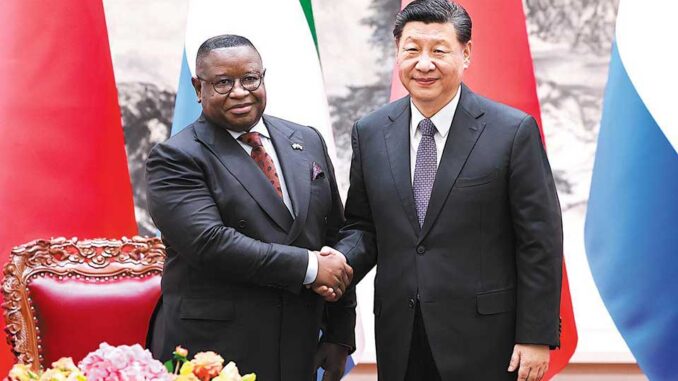
Putting Geopolitical Competition on Display: Sierra Leonian President Visits China
 President Xi Jinping shakes hands with visiting Sierra Leonean President Julius Maada Bio during their meeting at the Great Hall of the People in Beijing on February 28, 2024. Image via Xinhua
President Xi Jinping shakes hands with visiting Sierra Leonean President Julius Maada Bio during their meeting at the Great Hall of the People in Beijing on February 28, 2024. Image via XinhuaBy Lucas Engel
On Saturday, March 2, 2024, Julius Maada Bio, the President of Sierra Leone, returned from China, marking the end of the year’s first visit to China by an African head of state.
For his efforts, Bio returned home with $6.95 million in economic and technical assistance, $2.78 million in loan cancellation, and 1,500 tons of food assistance. Chinese leader Xi Jinping also pledged to “encourage” Chinese investment in the West African nation.
While these amounts may seem low compared to the generous financial commitments that China was known to extend to visiting heads of state from the Global South in pre-pandemic years, a closer look at evolving China-Sierra Leone economic ties reveals more than may initially meet the eye. Indeed, these deals indicate that the West African nation is benefitting from geopolitical competition in a way that can no longer be measured by the solitary yardstick of loan commitments that originally established China as a major force in Africa.
Yet, much of the reporting on Bio’s visit has focused on the comparatively modest financial support the Sierra Leonian head of state was able to secure during his stay in Beijing. Observers have drawn parallels between the seemingly meager results of Bio’s efforts and the general decline in Chinese loans provided to African sovereign borrowers over the past few years. The lack of substantial pledges of support has been portrayed as a sign of China’s growing aversion to the risk associated with lending to struggling borrowers, as well as its domestic economic woes.
However, recent developments in China-Sierra Leone economic engagement indicate that geopolitical competition is delivering benefits that exceed China’s past approach of debt finance for infrastructure.
As Western democracies diversify trade away from China in an attempt to bolster their economic positions, China has countered by also decoupling from the West. Its efforts to reduce dependence on iron ore from Australia, which accounts for 61% of China’s iron ore imports, has led to an influx of investment in West African countries with rich deposits of the metal.
In the past two years alone in Sierra Leone, China Kingho Energy Group Co Ltd has invested at least $383 million in an iron ore processing plant and an upgrade of port and railway infrastructure that is used to export iron ore originating from its Tonkili mine, the second largest iron ore mine in Africa. In neighboring Guinea, a consortium including Rio Tinto and five Chinese firms is set to launch the development of mining operations at Simandou, the world’s largest undeveloped iron ore deposit. Disagreements over who would fund the deep-water port and 552-kilometer railway that are needed to evacuate iron ore from the remote Simandou mountains stalled the project for decades. Chinese companies’ recent efforts to mobilize funding, including China Baowu Steel Group Corp Ltd’s $1.4 billion bond issuance last year, were a major factor in moving the project toward implementation.
The eagerness with which Chinese mining companies are pouring money into iron ore projects in West Africa suggests that Xi’s pledge to “encourage” Chinese investment in Sierra Leone may be more than rhetoric. In fact, China recently sought to cultivate the impression that it is boosting outward direct investment even as loan commitments decline. Although this narrative is underpinned solely by Chinese government statistics and has not been confirmed through other data sources, Chinese commercial activities in West Africa indicate that countries that offer China an advantage in geopolitical competition could be transitioning from borrower to investment partner.
For countries like Sierra Leone that find themselves at high risk of debt distress, this transition is a welcome opportunity to boost growth without increasing debt burdens.
Nevertheless, the benefits associated with investment partnerships do not arise automatically. Just as Western democracies and China seek diversification in their economic partnerships, African countries must forge strong economic ties without increasing their reliance on a single partner. In Sierra Leone, local media have raised concerns that Kingho’s lease on the Pepel Port and railway, which serves a number of mining operations besides Kingho’s own Tonkili mine, is distorting competition and preventing Sierra Leone from reaping the full rewards of its resource wealth.
The Democratic Republic of Congo (DRC) presents a more positive example in this regard. The recent renegotiation of the Sino-Congolese Sicomines agreement leveraged growing interest in the DRC’s strategically valuable cobalt reserves to improve the terms of an agreement that was signed when the DRC faced considerable challenges accessing international capital markets and found itself accepting less advantageous conditions in order to attract partners.
Geopolitical competition has been hailed as an opportunity for Global South countries to strike better deals by playing one side against the other. Their success in this game depends on keeping as many players on the board as possible.
Lucas Engel a Data Analyst with the Global China Initiative at the Boston University Global Development Policy Center.







Leave a Reply